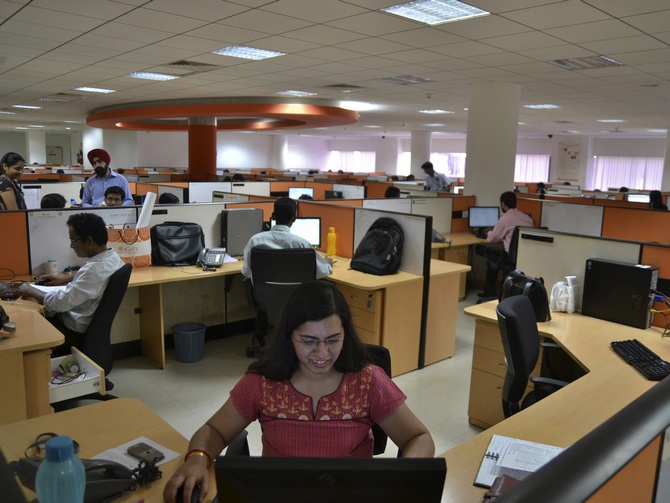Photographs: Adnan Abidi/Reuters TGC Prasad
What does it take to be successful?
Why do some people succeed and others fall flat on their faces?
If hard work isn't always the key then what is?
Presenting an excerpt from bestselling author TGC Prasad's latest book Why working hard is not good enough.
There are, as they say, two kinds of people -- those who work hard and those who work smart.
In his latest book Working hard is not good enough, bestselling author TGC Prasad writes of the virtues of unlearning, listening, innovating and common sense.
Prasad writes in his introduction:
I have seen students, teachers, executives, professions, and people from all walks of life working really hard.
That is the fundamental bedrock on which success can be built and sustained.
But then only a few people end up being perceivable successful
In my own experience as a management professional, I have seen people soar, build companies, start ventures, get better hikes, and land up with regular promotions and enriching global career opportunities, ad on the flipside, I have seen people fall, stagnate and some even wither…
I soon realised that there was no cookie cutter approach to being successful.
But then, there are some behaviours, competencies, some management methods, perhaps a combination of some and maybe all, in a given context, if applied well, can potentially lead to success.
And so we bring one such aspect that contributes greatly to success and one, as they say is found most rarely... from the chapter titled: Common Sense
'The three great essentials to achieve anything worthwhile are, first, hard work; second, stick-to-itiveness; third, common sense.'
Thomas A Edison
I believe common sense is about applying simple rationality in the given current social, business, or economic context. Essentially it lies in doing the best in a given context and there are no specific formulae.
Aristotle defined common sense as the actual power of inner sensation as opposed to judgement arising from the five senses (seeing, touching, smelling, tasting, and hearing). Merriam Webster dictionary defines common sense as: 'Sound and prudent judgement based on a simple perception of the situation or facts.'
Now let us look at some real life incidents and examples.
This one is hilarious. My brother, who lives in the US, told me an interesting story.
Apparently once, a robber entered a wine store, swung his pistol out, and shouted at the cashier to part with all the cash in the register.
The scared lady quickly took out all the cash and put it on the desk for the robber to take it with him.
The robber quickly stashed the cash into his bag and while going, he decided to grab a few bottles of wine.
As he picked his wine, the cashier timidly said, 'Wine can be picked only if you are above eighteen years of age,' to which the robber smiled and flashed his ID card saying that he was above eighteen and left.
The young lady promptly called the cops with the identification and the robber was caught! Sometimes having a good presence of mind can be termed as common sense.
***
In mid 1800s, California was under the grip of a gold rush. About 3,00,000 miners arrived at Sutter's mill in Sierra Nevada, and nearly $43 million a year of gold was being mined, mostly by Wells Fargo.
Levi Strauss and his brother-in-law David Stern noticed that these thousands of miners needed fabric, scissors, blankets, buttons, and canvas cloth.
So, together, they opened a wholesale shop to supply to various stores in west US.
Levi applied common sense and also sold to the miners directly carrying merchandise on a horseback.
During interactions with the miners, they told him that the cotton britches tore and gold ore spilled from their pockets.
So he got into manufacturing of trousers from canvas sail cloth with sturdy pockets, which wouldn't split.
Soon he ran out of canvas, so Levi ordered sturdier fabric named Serge DeNimes, a material named after the city in south of France.
Soon the name was shortened to Denim.
Around 1872, a tailor, Jacob Davis invented the process of sewing metal rivets into the men's work trousers, at points of strain, where it tore the most.
Since he was short of funds, Jacob approached Levi to patent the process together and US patent 1,39,121 was issued for placing copper rivets in men's pants.
As you can see a series of events led one to the other and Levi's blue jeans was born.
Was it strategic thinking? Definitely not. Was it serendipity? Not really! Levi used his common sense to identify an opportunity and went about fulfilling it.
Common sense, at times, is identifying the opportunity at hand, and trying to fulfil it. And there are many opportunities out there.
We often reject what we ought to pursue, even before an idea is fully born. Only those who unlock the power behind common sense, actually get there.
Purchase a copy of Why working hard is not good enough here.
Also purchase his other books here.
Please click NEXT to continue reading the excerpt
Why working hard is not good enough
Photographs: Stringer/Reuters
With minimal support and upon strong insistence from senior management, I took up the assignment of starting a new business unit.
The client was excruciatingly painful and the pricing for the engagement was so ridiculously low that life became hell to generate even miniscule margins.
To achieve reasonable gross margins, we had to be stringent with budgets and the compensation offered was below market rates.
So we ended up recruiting those we could afford and fortunately we could see a few sparks of talent here and there. But then, most were rookies.
The rookies needed time to mature, couldn't handle the deliverables on the go, and managers came under intense pressure, and the client started crying foul.
After the first few months into this business, several times, I vehemently opposed doing business with the client and expressed that we were working with the wrong client both from a pricing and attitude point of view, and our efforts do not justify the returns.
But the management anticipated large volumes of business from the client and insisted that we continue to plod away. But in reality the client had no intention of giving any large volume business.
In fact, the client exactly knew our predicament. Sitting on a high pedestal, the client turned ruthless.
Partnering really never mattered and the client was continually playing one vendor against the other for want of better pricing.
Reduction in pricing was a topic of discussion in every agenda and meeting; and I often felt like a freshman under the scanner.
It was like a pressure cooker, ready to burst anytime.
Soon things became unbearable, employees stopped smiling, the joining ratio plummeted, attrition started to climb, and though we were making some margins, we were sucking the system dry and none of us were happy.
Every coin always has two sides-the client continued to gain from the abysmally low price, and the management from additional revenues-and we were being flipped in between.
But then such environments don't last long and this too ended pretty quickly. Personally, it was an eye opener.
Very early on, I was fortunate enough to get a deeper understanding of people and what their real motivations were, and I moved on to the next assignment.
The management too learnt its lessons and in the meanwhile engagement with the client concluded.
After all, we are humans and have our desires and beliefs despite everything that we come by in our lives.
Prejudices and emotions often create a veil and suppress common sense from surfacing.
It is utter common sense not to work with clients, from whom many stalwarts already walked away, and it is a pity that we didn't learn from other's experiences. But then, often common sense unfolds only after all the mistakes have been made and one relegates the past to oblivion.
The experience unshackled my thinking and fresher horizons dawned, which otherwise wouldn't have.
In retrospect, after working with global organizations and world-class managements, though it is common sense, the insights I gained were significant viz., 'Work with clients who value your contribution, who do not commoditize your worth by offering peanuts.
Secondly, it is a futile proposition to provide a discount upfront in anticipation of future volumes.
Discounting should be scaled on realization of volumes. Who knows, in the years to come, managements might change, contracts could be rescaled, and monkeys could fly.
Thirdly, one should always work only with world-class managements who have the propensity to listen, learn, and adapt.
Lastly, heed to common sense and listen to others when it comes to understanding people and their motives but rely on your inner voice.'
TGC Prasad is the author of bestselling books such as Unusual people do things differently, From the eye of my mind and Along the Way. Besides being on the advisory board of several companies, he is the managing partner of TGC Consulting, a human capital consulting firm.
Extracted from Working hard is not good enough by TGC Prasad (Rs 299) with kind permission of Random House India.
Purchase a copy of the book here.



Comment
article